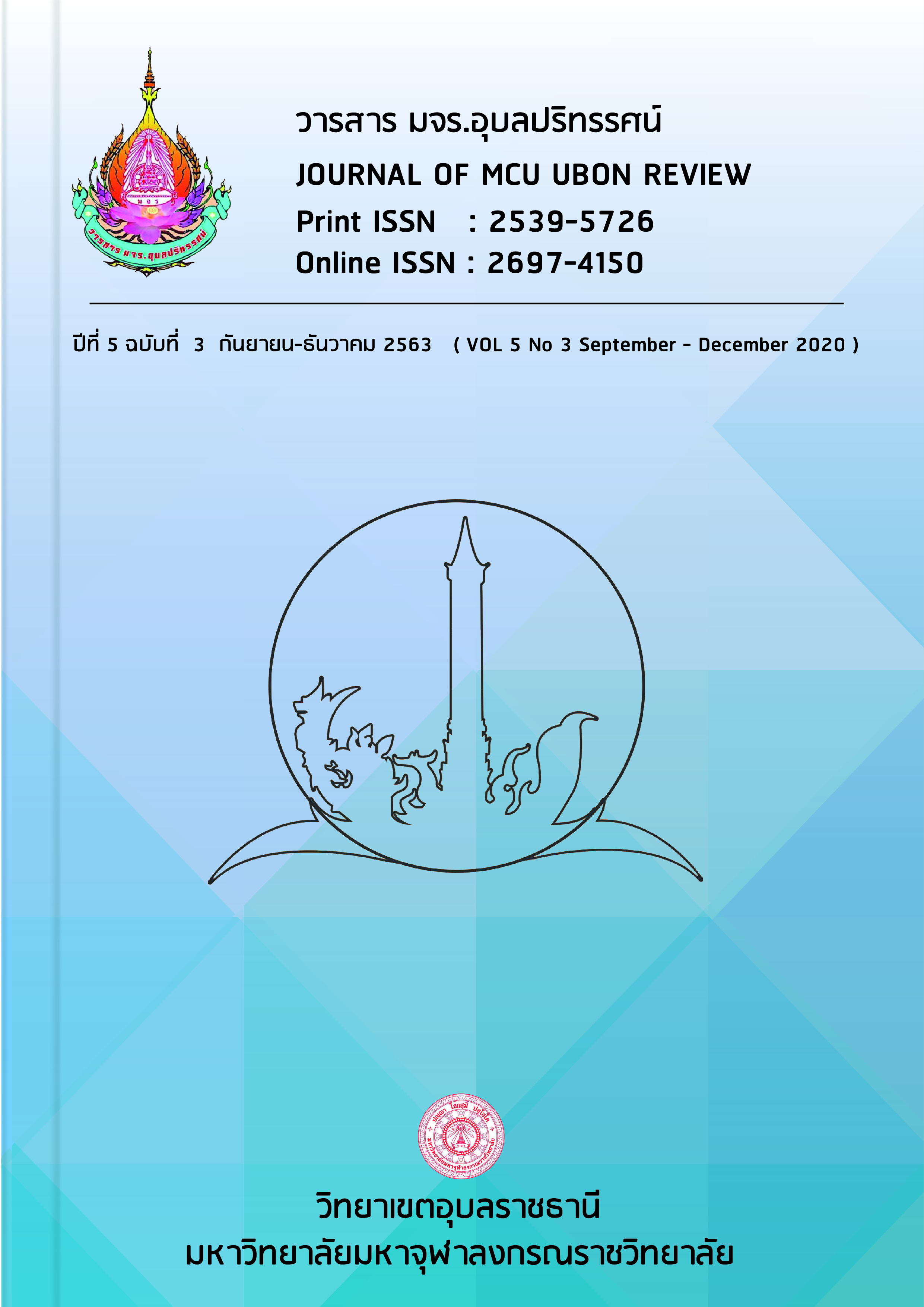การศึกษาผลสัมฤทธิ์ทางการเรียน หน่วยการเรียนรู้ เรื่อง แรงและการเคลื่อนที่ และทักษะกระบวนการทางวิทยาศาสตร์ ของนักเรียนชั้นประถมศึกษาปีที่ 3 โดยใช้การจัดการเรียนรู้แบบสืบเสาะหาความรู้ร่วมกับแบบฝึกทักษะ
Main Article Content
บทคัดย่อ
การวิจัยครั้งนี้มีวัตถุประสงค์เพื่อ 1) พัฒนาแผนการจัดการเรียนรู้ หน่วยการเรียนรู้ เรื่อง แรงและการเคลื่อนที่ ของนักเรียนชั้นประถมศึกษาปีที่ 3 โดยใช้การจัดการเรียนรู้แบบสืบเสาะหาความรู้ร่วมกับแบบฝึกทักษะให้มีประสิทธิภาพตามเกณฑ์ 80/80 2) เปรียบเทียบผลสัมฤทธิ์ทางการเรียนของนักเรียนชั้นประถมศึกษาปีที่ 3 โดยใช้การจัดการเรียนรู้แบบสืบเสาะหาความรู้ร่วมกับแบบฝึกทักษะ ระหว่างก่อนเรียนและหลังเรียน 3) เปรียบเทียบทักษะกระบวนการทางวิทยาศาสตร์ขั้นพื้นฐานของนักเรียนชั้นประถมศึกษาปีที่ 3 โดยใช้การจัดการเรียนรู้แบบสืบเสาะหาความรู้ร่วมกับแบบฝึกทักษะ ระหว่างก่อนเรียนและหลังเรียน กลุ่มตัวอย่าง คือ นักเรียนชั้นประถมศึกษาปีที่ 3 โรงเรียนบ้านหนองแดง(คุรุราษฎร์บำเพ็ญ) ภาคเรียนที่ 2 ปีการศึกษา 2562 จำนวน 20 คน ซึ่งได้มาโดยการสุ่มอย่างง่าย เครื่องมือที่ใช้ในการวิจัย คือ 1) แผนการจัดการเรียนรู้ โดยใช้การจัดการเรียนรู้แบบสืบเสาะหาความรู้ร่วมกับแบบฝึกทักษะ 2) แบบฝึกทักษะกระบวนการทางวิทยาศาสตร์ 3) แบบทดสอบวัดผลสัมฤทธิ์ทางการเรียน หน่วยการเรียนรู้ เรื่องแรงและการเคลื่อนที่ 4) แบบวัดทักษะกระบวนการทางวิทยาศาสตร์ สถิติที่ใช้ในการวิเคราะห์ข้อมูล ค่าเฉลี่ยส่วนเบี่ยงเบนมาตรฐาน และการทดสอบค่าที (t-test Dependent Sample) ผลวิจัย พบว่า 1) แผนการจัดการเรียนรู้ หน่วยการเรียนรู้ เรื่อง แรงและการเคลื่อนที่ โดยใช้การจัดการเรียนรู้แบบสืบเสาะหาความรู้ร่วมกับแบบฝึกทักษะของนักเรียนชั้นประถมศึกษาปีที่ 3 มีประสิทธิภาพ E1/E2 เท่ากับ 81.50/80.50 ซึ่งสูงกว่าเกณฑ์ที่กำหนดไว้ 2) ผลสัมฤทธิ์ทางการเรียนของนักเรียนชั้นประถมศึกษาปีที่ 3 โดยใช้การจัดการเรียนรู้แบบสืบเสาะหาความรู้ร่วมกับแบบฝึกทักษะ หลังเรียนสูงกว่าก่อนเรียนอย่างมีนัยสำคัญทางสถิติที่ระดับ .05 3) ทักษะกระบวนการทางวิทยาศาสตร์ขั้นพื้นฐานของนักเรียนชั้นประถมศึกษาปีที่ 3 โดยใช้การจัดการเรียนรู้แบบสืบเสาะหาความรู้ร่วมกับแบบฝึกทักษะ หลังเรียนสูงกว่าก่อนเรียนอย่างมีนัยสำคัญทางสถิติที่ระดับ .05
Article Details
เอกสารอ้างอิง
กระทรวงศึกษาธิการ. (2552). หลักสูตรแกนกลางการศึกษาขั้นพื้นฐาน พุทธศักราช 2551.
กรุงเทพฯ: สำนักงานคณะกรรมการการศึกษาขั้นพื้นฐาน กระทรวงฯ. โรงพิมพ์
ชุมนุมสหกรณ์การเกษตรแห่งประเทศไทย.
ณัชชากัญญ์ วิรัตนชัยวรรณ. (2555). ผลการจัดกิจกรรมการเรียนรู้โดยใช้เทคนิคการสืบ
เสาะหาความรู้ (5E) เพื่อพัฒนาทักษะกระบวนการทางวิทยาศาสตร์จิตวิทยาศาสตร์
และผลสัมฤทธิ์ทางการเรียนวิทยาศาสตร์ของนักเรียนชั้นประถมศึกษาปีที่ 6.
บัณฑิตวิทยาลัย : มหาวิทยาลัยราชภัฏเชียงราย.
บุญเกื้อ ควรหาเวช. (2543). นวัตกรรมการศึกษา, พิมพ์ครั้งที่ 6. นนทบุรี: SR Printing.
พิมพ์แพร สืบบุก. (2554). ผลการใช้กระบวนการสืบเสาะหาความรู้ 7E ที่มีต่อการคิด
วิเคราะห์และผลสัมฤทธิ์ทางการเรียน เรื่อง กฎหมายคุ้มครองสิทธิของบุคคลของนักเรียนชั้นมัธยมศึกษาปีที่ 1 โรงเรียนฉิมพลี กรุงเทพมหานคร. บัณฑิตวิทยาลัย
:มหาวิทยาลัยสุโขทัยธรรมาธิราช.
พรรัตน์ กิ่งมะลิ. (2552). การพัฒนาทักษะกระบวนการทางวิทยาศาสตร์ เรื่อง พืชโดยใช้การ
สอนแบบสืบเสาะหาความรู้สําหรับนักเรียนชั้นประถมศึกษาปีที่ 2 .บัณฑิตวิทยาลัย : มหาวิทยาลัยราชภัฎเพชรบุรี, เพชรบุรี.
บุญชม ศรีสะอาด. การวิจัยเบื้องต้น. พิมพ์ครั้งที่ 7. กรุงเทพฯ : สุวีริยาสาส์น, 2545.
วาชินี บุญญพาพงศ์, (2552). การศึกษาผลสัมฤทธิ์ทางการเรียน เรื่อง พืชและสัตว์ทักษะ
กระบวนการทางวิทยาศาสตร์และจิตวิทยาศาสตร์ของนักเรียนชั้นประถมศึกษาปีที่ 5
จากการจัดการเรียนรู้แบบวัฏจักรการสืบเสาะหาความรู้. บัณฑิตวิทยาลัย
: มหาวิทยาลัยราชภัฏนครราชสีมา.
สุทธภา บุญแซม. (2553). ความสามารถในการคิดอย่างมีวิจารณญาณและผลสัมฤทธิ์ทางการ
เรียนวิชาฟิสิกส์หน่วยการเรียนรู้ เรื่อง คลื่นแม่เหล็กไฟฟ้าของนักเรียนชั้นมัธยมศึกษาปีที่ 6 โดยใช้การสอนแบบสืบเสาะหาความรู้ (7E). บัณฑิตวิทยาลัย
: มหาวิทยาลัยราชภัฏนครราชสีมา.
สุภาพร พลพุทธา. (2552). ผลการจัดกิจกรรมการเรียนรู้โดยใช้กระบวนการสืบเสาะหา
ความรู้ตามวงจรการเรียนรู้แบบ 7E ในรายวิชาฟิสิกส์ ชั้นมัธยมศึกษาปีที่ 5.
บัณฑิตวิทยาลัย :มหาวิทยาลัยราชภัฏสกลนคร.
สุวคนธ์ ผ่านสำแดง. (2552). ผลการจัดกิจกรรมการเรียนรู้แบบวัฏจักรการเรียนรู้ 7 ขั้น (7E)
เรื่องอาหารและสารอาหาร กลุ่มสาระการเรียนรู้วิทยาศาสตร์ชั้นประถมศึกษาปีที่ 4.
บัณฑิตวิทยาลัย : มหาวิทยาลัยมหาสารคาม.


